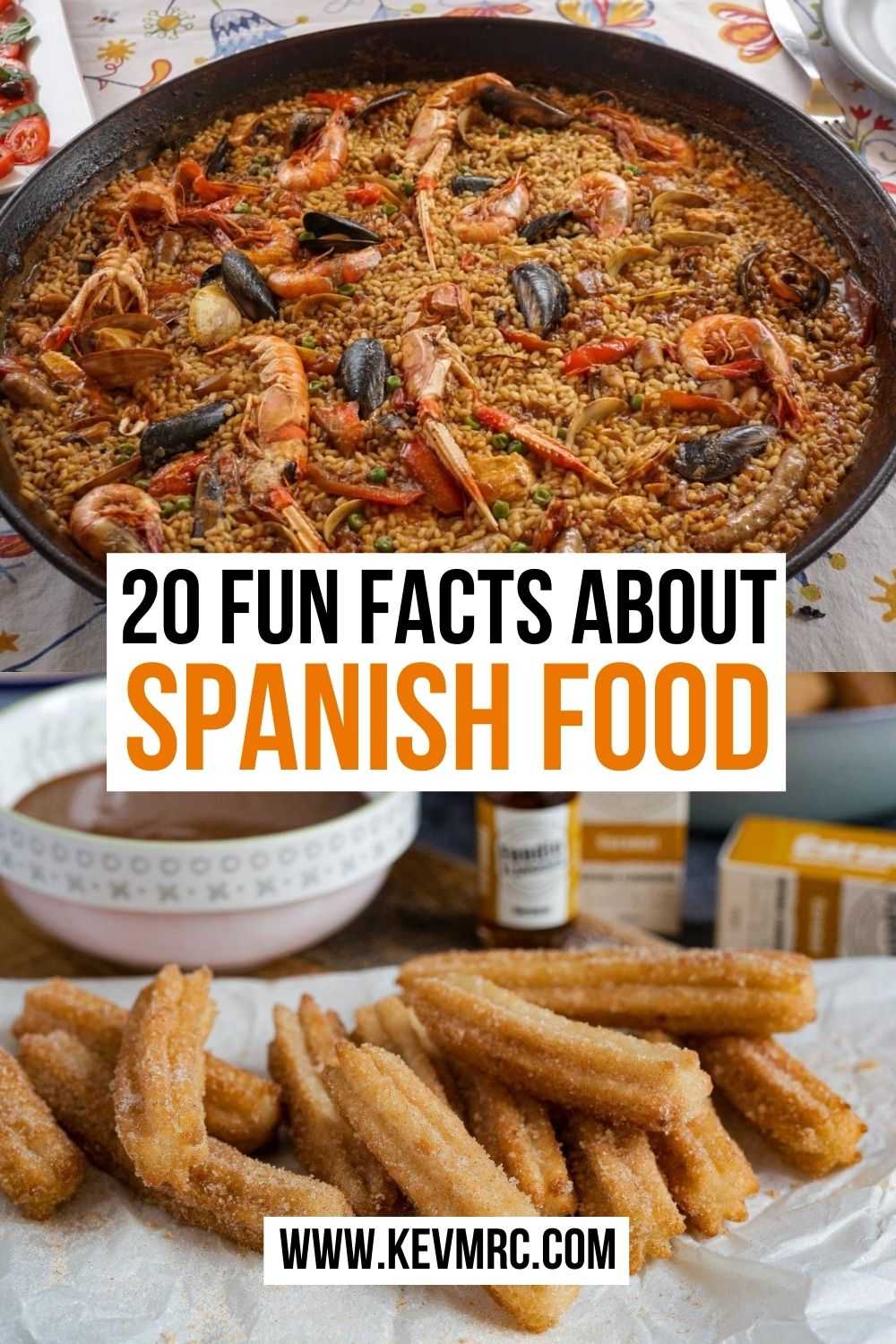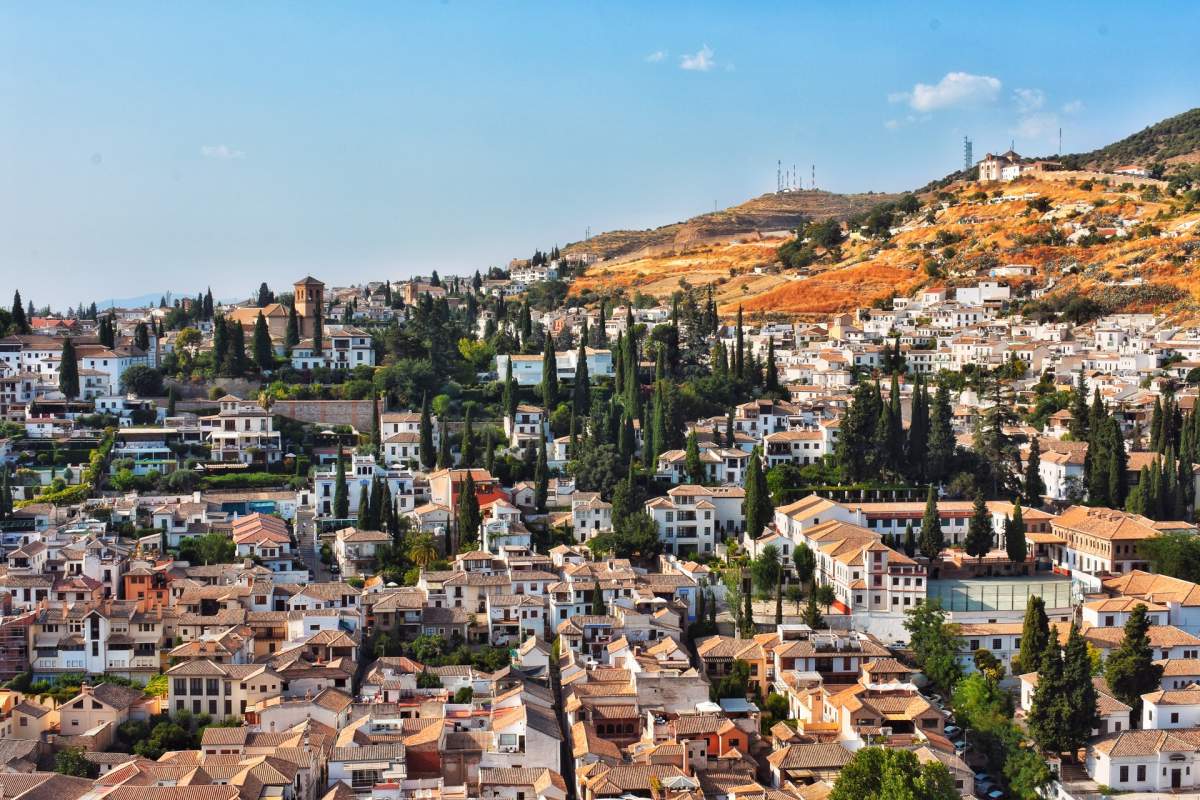20 Interesting Facts About Spanish Food (100% true facts)
Spain is known and appreciated for a lot of things including its history, monuments, beaches, the sweetness of life, and the festive spirit that reigns there, but also for its gastronomy! The Spanish cuisine is indeed very rich and varied, each region has its own typical dishes and unique flavors based on local products.
Discover 20 interesting facts about Spanish food in this post! 🥘
The Best Spain Food Facts
Spanish food is more than just tapas and paella. And although those are delicious, there are still lots of facts that you probably don’t know about.
That is exactly why I made a list of the best Spanish food facts: get your forks ready and enjoy!
1. Spain grows 13 percent of the world vineyard … and is #1
There are only 5 countries that represent more than half (a bit over 50%) of the vineyard world: China, France, Italy, Turkey and… Spain.
And though you might not think so, neither France nor Italy are the #1 country in the world with the most vineyards. That’s right, Spain is the top country in the world in terms of area covered by vineyards, with 13% of the world’s vineyards, but China is rapidly growing and might overtake Spain pretty soon.

Celler Avelino Vegas in Segovia
2. Several common ingredients were imported to Europe by Spain
There are probably some ingredients that you are using either daily or very often, especially as a European. For instance, a Mediterranean could not imagine avoiding tomatoes in all their meals for a week, a smoker needs tobacco for their cigarettes, and a chocolate lover needs cocoa for their bars.
Well, all those precious and nowadays very common things would never even exist in Europe if it were not for Spain.
3. The authentic paella was not a seafood dish
Paella is basically the unofficial symbol of Spain in terms of food. It is not considered the national dish by Spaniards since it is considered to be a dish from the Valencian region. “Paella” is actually the name of the wide and shallow pan used to cook this dish. It literally means “frying pan” in Valencia’s regional language.
But what most people don’t know is that paella used to be made of chicken, rabbit, and pork.
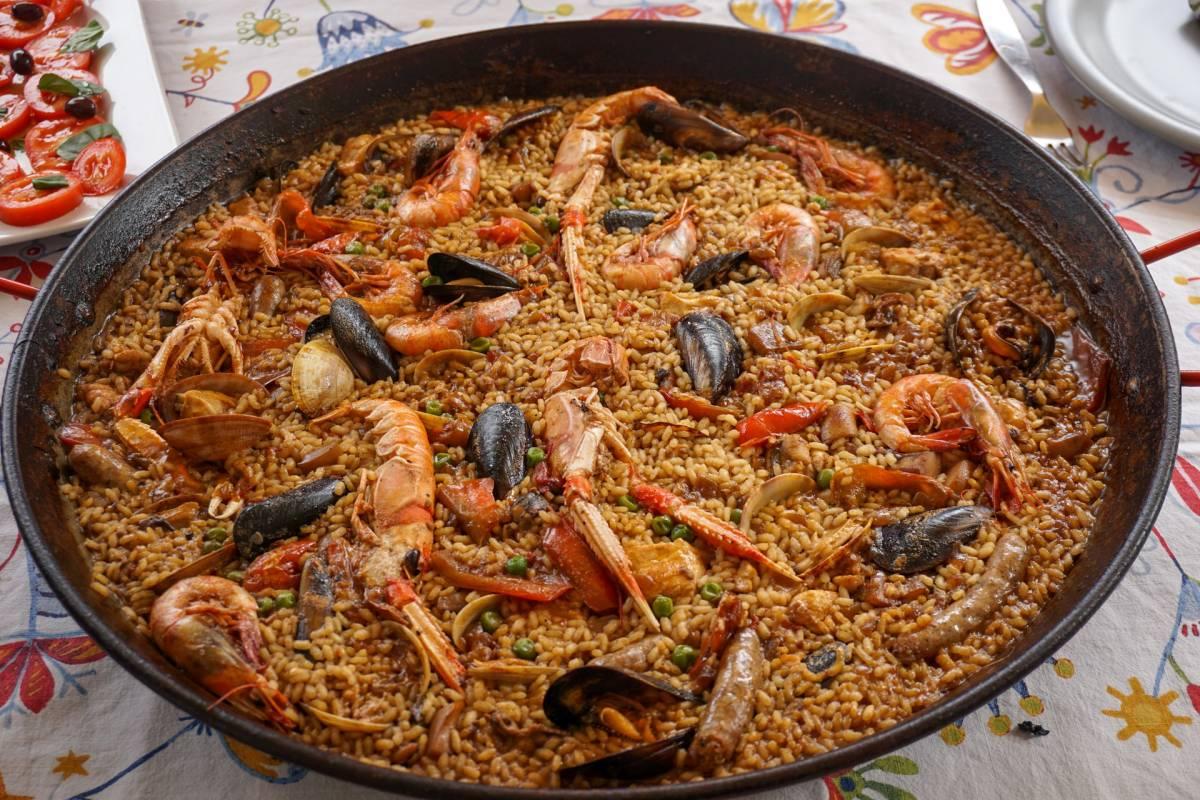
4. Italy and Greece are not the top olive oil producers in the world: it is Spain
Europe is by far the largest producer of olive oil in the world, with 69 percent. That makes sense, since olive oil is very used throughout all Europe but more specifically in all Mediterranean countries such as Italy, Greece and Spain.
Speaking of which, Italy and Greece are reputed for their olive oil production, but Spain produces far more. With a staggering 44 percent of the world production, Spain is the number one olive oil producer in the world, and makes more than twice that of Italy.
5. Tapas are not what you think
When you think of tapas, you probably imagine a table full of appetizers, all different and tasty. Ham, bread, potatoes, tomatoes, and olives are there. People are gathered, sometimes in bars, and order several plates they share.
Well, you are only partially right. Tapas are actually not a food but rather a way of eating. Basically, you go out in a crowded bar with a large group of friends and order multiple dishes.
6. The people of Cádiz, Spain, are said to have invented fried fish
Cádiz is located in Andalusia, in southwestern Spain. It is a city, a port, and one of the oldest inhabited places in Western Europe, with archeological remains dating to 3100 years.
There, people claim to have invented fried fish, and that the UK imported it for their famous fish and chips. Fried fish is still very popular in both Spain and the UK.
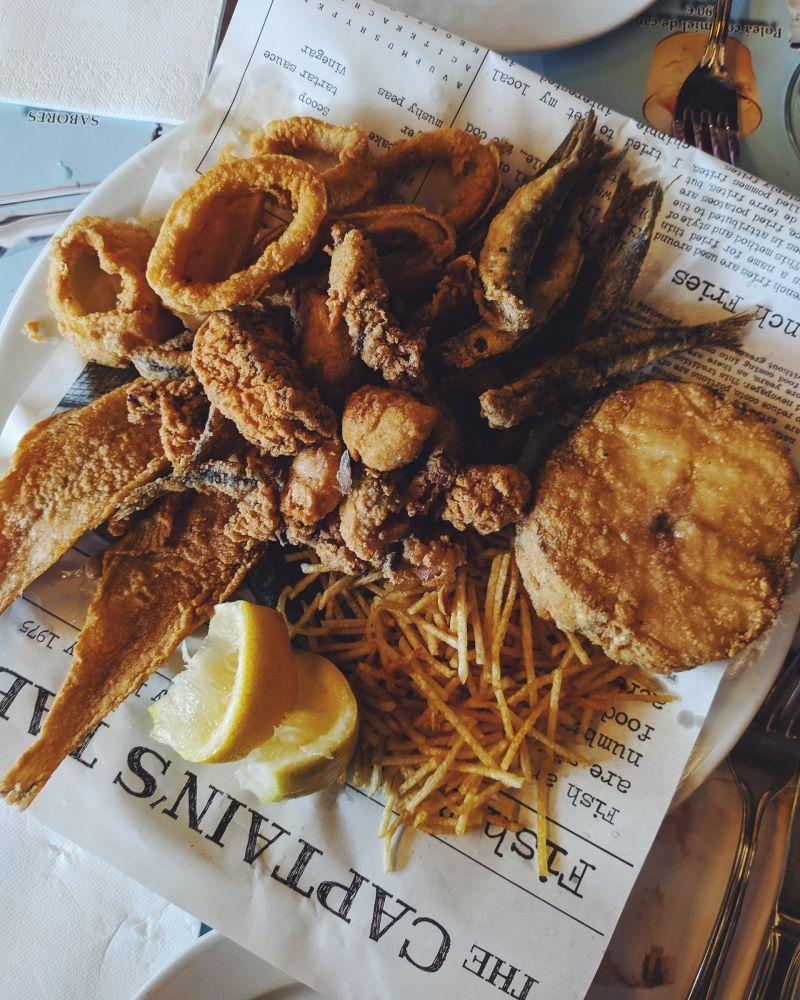
7. Spain produces more than just red wine
The most famous Spanish wines are red, and that is a bit misleading. Actually, more than 60 percent of Spain’s vineyards are dedicated to white wine.
You can find lots of brandy and sherry in Spain, but also simply delightful white wines, though less renowned than the red ones.
8. Almost 75 percent of the world’s saffron is produced in Spain
Saffron is one of the world’s most expensive spices by weight, and has even been the most expensive one for a long time. It is used in a variety of dishes, such as the French “bouillabaisse”, the Milanese “risotto” in Italy and… the paella in Spain.
It gives the paella its classic yellow look, and Spain is by far the biggest saffron producer in the world, with almost 75 percent of it!

9. Traditional Spanish desserts are creamy and with some milk
Desserts are not the first thing that come to mind when you are thinking about Spain. There are very famous dishes such as paella, obviously, but you can still find traditional Spanish desserts.
Those are creamy, with milk and regularly go with cinnamon. The most famous ones are “el flan”, “el arroz con leche” and “las natillas”. To be honest, they are not the most exciting part of Spanish food.
10. There are some unspoken rules about food in Spain
If you have never visited Spain, you might be surprised about some rules regarding the food, especially if you come from afar.
For instance, churros (and the thick chocolate that goes with) are mostly breakfast, not dessert. Then, do not expect eggs for breakfast, as they are for the other meals. And, it is acceptable to get served a supermarket ice cream… in a restaurant!

11. Spanish people usually don’t eat that much spicy food
Chorizo is the famous Spanish pork sausage, eaten in various ways. It is known as a spicy sausage because of all the paprika in there, but that’s about the only thing close to being spicy among Spanish food.
That might surprise you, but generally spicy food is not on the menu in Spain. According to the legend, a king ate pepper the conquistadors brought him, and it was so spicy he would not want anything like that, ever.
12. In Spain, you will find pork everywhere
Ham, chorizo, tapas: pork is king in Spain.
You literally cannot get away from pork, it is eaten in various ways and all around the country. That is probably because in 1492, Spanish Muslims were asked to choose between their faith and remaining there, and those who stayed had to eat pork; it was the easiest way to know anyone’s religion.
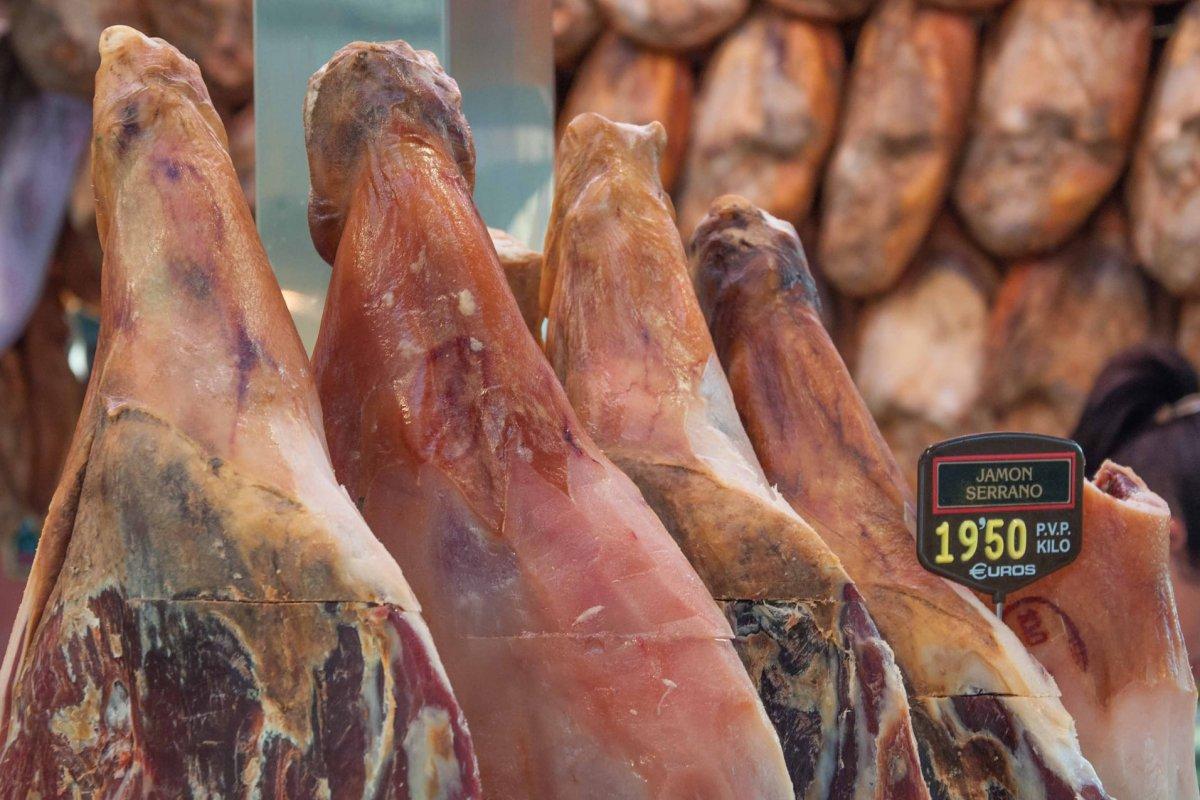
13. Spain is the second country in terms of bars per inhabitant
You know it already, friends share tapas very often in Spain, and for good reasons: bars are all over the place!
The only country topping Spain regarding bars per inhabitant is Cyprus, and if you are looking to hang out with a group of people, then Spain is a perfect destination.
14. There are different kinds of ham in Spain
Spain is famous for its “jamón”, mostly called “jamón serrano”. It is basically dried ham and one of the Spanish cuisine’s finest items.
You can find different types of ham in Spain, like “pata negra”, “Ibéricos de pienso” or “bodega”. The country has plenty of things for you to discover, starting with hams!
15. Spain produces plenty of fruits
The Mediterranean climate is ideal generally speaking. It is very sunny, making it perfect for both tourists and farmers.
You can find fantastic fruits throughout the whole year in Spain, like cherry, apricot and peach in spring, pears, grapes, and raspberries in summer, oranges and tangerines in autumn, and melon and strawberries in winter. And those are just examples, there are far more fruits than that.
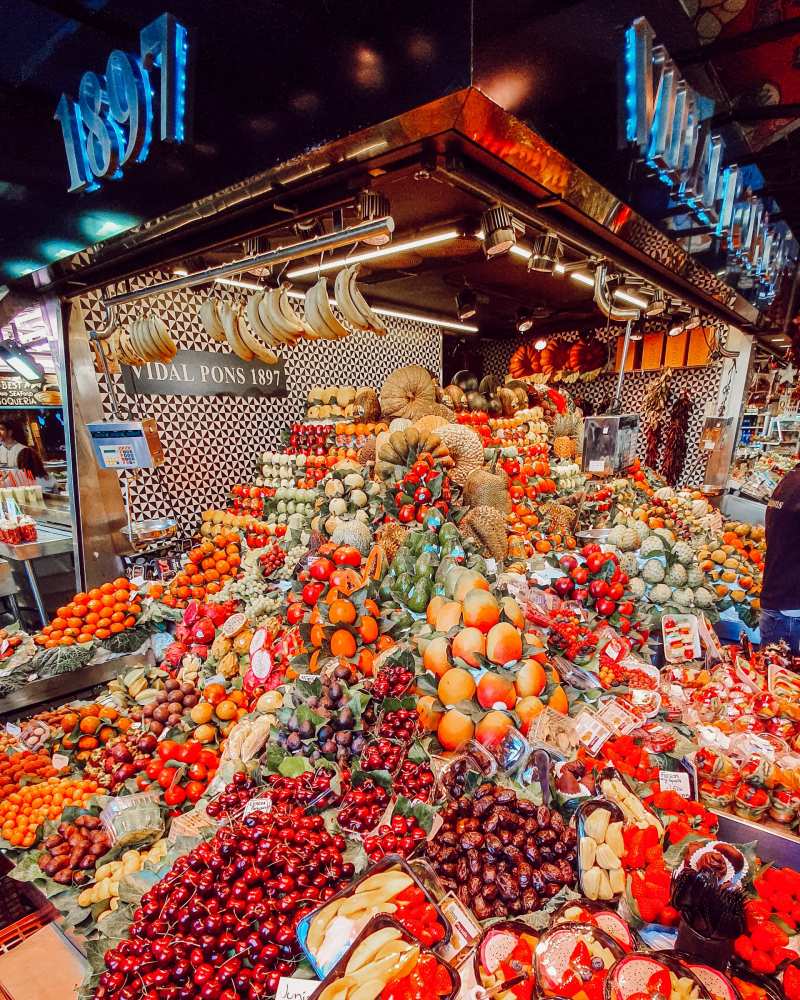
Fruits in La Boqueria market, Barcelona
16. The origins of tapas are not very clear, but there is a theory
Just like most popular dishes, traditions, or stories, the origins of tapas are quite unclear.
Different theories are being claimed, but the most popular legend says that, in order to keep flies out, the first tapas were made of cheese and ham slices, placed on top of a glass. Since “tapar” means “to cover” in Spanish, that would make sense, but again, we will probably never know the exact roots of tapas.
17. The ideal temperature to serve Spanish red wine at is 8 to 13 °C (47 to 56 °F)
If you are a wine lover, you have probably heard the advice to drink wine at room temperature at least once.
Well, that is a bit true… but mostly false. The actual room temperature you have to consider is the cellar temperature, which usually ranges from 8 to 13 °C (47 to 56 °F). Make sure you think of that before tasting a Spanish wine.
18. Spanish people have unusual breakfast
While most people around the world probably eat eggs, cereals, or marmalade during breakfast, in Spain, it is a whole other story.
A very popular breakfast is “Tostada con tomate”, which is tomato and fresh herbs mixed and placed on top of crunchy bread (“toast with tomatoes”). Churros are also liked, especially dipped into coffee or hot chocolate, with a little bit of sugar.
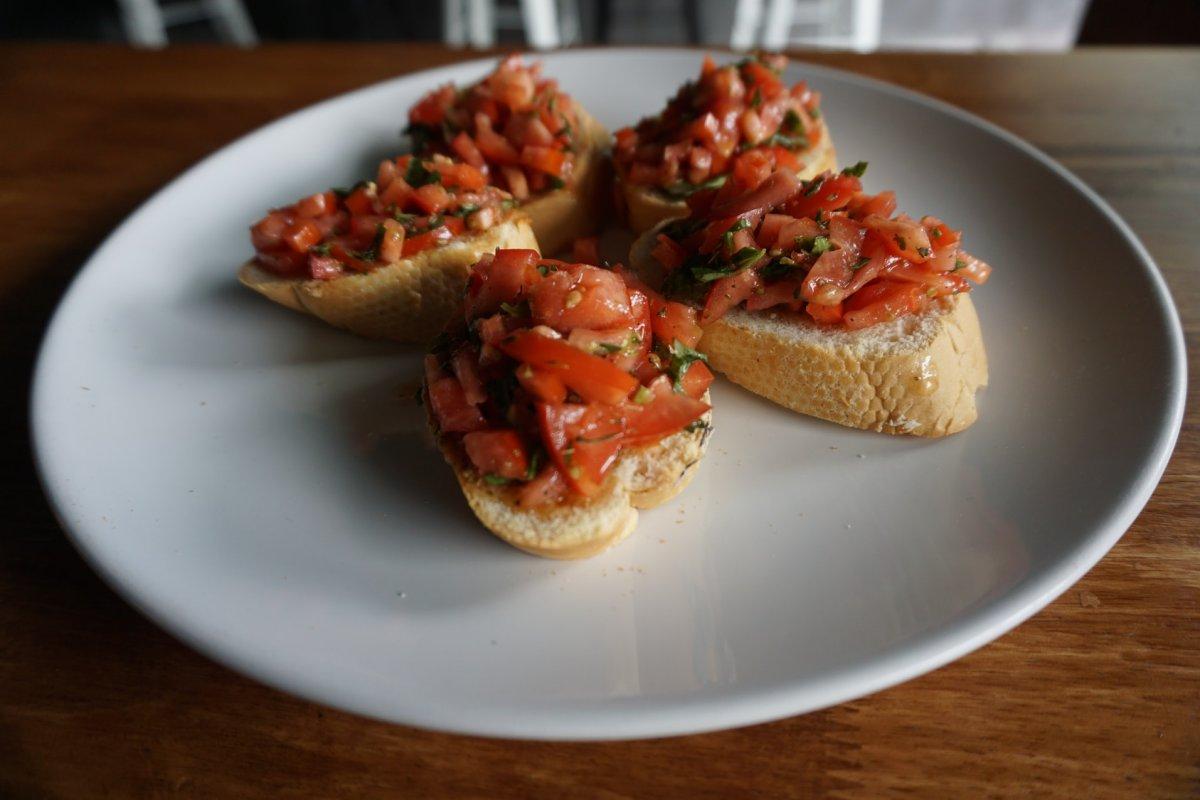
Tostada con tomate
19. Sangria may not originate from Spain… or Europe
Just like tapas, there are still debates about where sangria takes its roots from.
While this is the most popular beverage in Spain, made of red wine and citrus fruits, it may not come from Spain, or even Europe as a whole. Indeed, it is said that the first sangria came from South America, or the Antilles. Early versions of sangria were popular in Greece and England as well.
20. The Spanish omelet is called “tortilla de patatas”
While the French have their worldwide famous omelet, the Spanish have an equivalent called “tortilla de patatas”. It is made of eggs, potatoes and sometimes onions.
Usually, it is served among tapas, at room temperature. The legend says that Tomás de Zumalacárregui invented the “tortilla de patatas” to easily feed his troops. Anyway, Spanish tortillas became more and more popular during the Carlist wars (19th century).

And there you have them, the 20 fun facts about Spain food.
If you want more, keep reading, I still have tons of facts to tell you about!
More Facts!
Did you like these facts about food in Spain?
If yes, then here are more facts about Spain, I’m sure you’ll love reading them!
Here’s the main guide of the best Spain facts 👉 All the Facts about Spain
Check out these facts by city/region:
- Facts about Madrid
- Facts about Catalonia
- Facts about Bilbao
- Facts about Barcelona
- Facts about Granada
- Facts about Malaga
- Facts about Seville
- Facts about Valencia
- Facts about Castilla la Mancha
Or these Spain facts by topic:
- Facts about Christmas in Spain
- Facts about la Semana Santa in Spain
- Facts about religion in Spain
- Facts about schools in Spain
- Facts about the Spanish language
- Facts about bullfighting in Spain
- Facts about sports in Spain
- Facts about music in Spain
Or click here to see ALL the facts up on the blog! Spoiler alert: there’s A LOT of them.
The Full List of 20 Spain Food Facts
- Spain grows 13 percent of the world vineyard … and is #1
- Several common ingredients were imported to Europe by Spain
- The authentic paella was not a seafood dish
- Italy and Greece are not the top olive oil producers in the world: it is Spain
- Tapas are not what you think
- The people of Cádiz, Spain, are said to have invented fried fish
- Spain produces more than just red wine
- Almost 75 percent of the world’s saffron is produced in Spain
- Traditional Spanish desserts are creamy and with some milk
- There are some unspoken rules about food in Spain
- Spanish people usually don’t eat that much spicy food
- In Spain, you will find pork everywhere
- Spain is the second country in terms of bars per inhabitant
- There are different kinds of ham in Spain
- Spain produces plenty of fruits
- The origins of tapas are not very clear, but there is a theory
- The ideal temperature to serve Spanish red wine at is 8 to 13 °C (47 to 56 °F)
- Spanish people have unusual breakfast
- Sangria may not originate from Spain… or Europe
- The Spanish omelet is called “tortilla de patatas”
Share the knowledge! Click on the buttons below to share these facts with your friends, and help them learn more about the world 🙂
Pin this to Pinterest!
Enjoyed this guide? Then help a fellow traveler and pin it! They'll most definitely love you for it, 100% guarantee.
